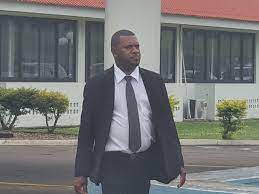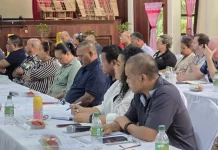A winning candidate from the Malekula Constituency, Sanick Asang, was declared eligible and contested the Vanuatu Snap Election despite still serving a suspended sentence.
The Director of Vanuatu Correctional Services, Johnny Marango, has confirmed the former Member of Parliament (MP) and now MP-elect, is still serving a suspended sentence.
Meanwhile, whether local or international, it is good practice for electoral observers to meet with as many electoral stakeholders as possible, but there are no protocols or regulations specifying who they are required to meet with.
The Electoral Commission (EC) and the Vanuatu Electoral Office (VEO) made the above statement after Transparency International Vanuatu (TIV) Chief Executive Officer (CEO), Dr Willie Tokon, criticised the last-minute arrival of the 49 regional and International Observers who took part in the Snap Election on 13th of October
The EC and the VEO noted CEO Tokon’s concern regarding the presence of international observers and presented several clarifications.
Firstly, electoral observers (local or international) do not ‘take part’ in the elections. Their role (an important one) is to systematically collect information on the electoral process to be able to come up with a qualified judgement as to the quality of the election.
“here is no international standard as to who are mobilised to be electoral observers,” the EC stated.
“Whether local or international, it is good practice to meet with as many electoral stakeholders as possible, but there are no protocols or regulations specifying who may offer to be electoral Observers, local or internationals, should meet with.
“There is no ‘regulation’ in Vanuatu, and indeed in the rest of the world, that any observation mission should be obliged to meet with local groups or that local observation groups are to ‘help’ international groups with their observation programme.
“The observers (both local and international) are intended to be independent, choosing their polling stations to be observed and not told where to go as this goes against the independence of observation groups.”
Generally, international observers will try to meet with as many as possible stakeholders, including local observers, but once again, there are no established protocols that make it an obligation for international observers to meet with local observers.
“The focal point for any observer group is always the Electoral Authority, in this case the EC and the VEO who are in charge of accrediting these groups and providing the necessary information for them to conduct their work, independently and objectively,” the Commission stated.
A full training session for Electoral Observers was held at the Convention Centre on Wednesday, 12 October with an Observer’s Manual, a USB loaded with all required documents and official Observers Badges mounted on lanyards. This session was live-streamed for Observers unable to attend the training to follow.
While both local and international observers have the same function, they have substantial differences in their approach and the characteristics. Local observers have a long-term vision of the process but International Observers are often seen as more “neutral” as they don’t have a specific interest in the results of the election. Meetings between local and international observers may be very useful, as long as all groups maintain their independence, but this contact and collaboration is not mandatory.
It is clear that there will always be fewer international observer presences than local observers, as the capacity of international organisation to observe an election cannot compete with that of national organisations.
“In an ideal situation, the longer-term presence of observers is the best option.
“However, the nature and timeline of the Snap Election did not allow for these circumstances to undertake extended consultation and observation,” the EC stated.
“All the efforts carried out under the circumstances of a very tight timeline, observer mobilisation and resourcing must be applauded. The Department of Foreign Affairs played a critical role in issuing Special Category Exemption Visas for the International Observers,” it said….
SOURCE:













